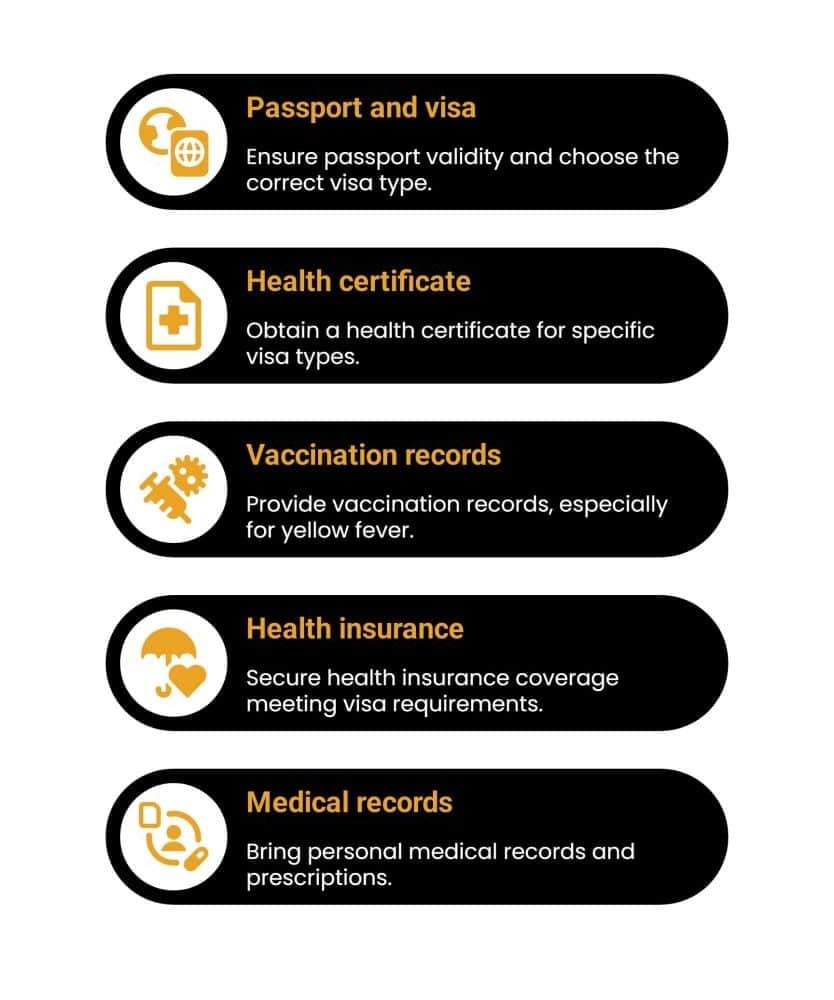Moving to Thailand? Here are the health documents you should prepare before you go
Prepare your medical paperwork and coverage to ensure a smooth start in Thailand

The Thaiger key takeaways
- Valid passport, visa documents, health certificate, and vaccination records are essential for immigration and medical care in Thailand.
- Health insurance that meets visa requirements, like Cigna, provides protection, direct billing, and access to a wide hospital network.
- Keeping personal medical records and prescriptions up to date ensures quick treatment and smooth communication with doctors
Moving to Thailand can be exciting, but having the right health papers ready makes life easier. You’ll need things like medical certificates, vaccination records, and proof of health insurance before you travel. These documents help with immigration and make sure you can access good healthcare once you arrive. Having reliable insurance, such as Cigna health insurance, gives you peace of mind and financial protection during your stay. This guide will walk you through the key health documents to prepare so you can settle in smoothly and focus on enjoying your new life in Thailand.
On this page
| Section | Summary |
|---|---|
| Health documents checklist for moving to Thailand | Ensure you have a valid passport and visa, health certificate, vaccination records, insurance, and personal medical records before moving to Thailand. |
| Additional tips for expats using Cigna health insurance | Speak with Cigna before arrival to match coverage to visa and health needs; use direct billing, claims support, and telemedicine for smoother healthcare access. |
Health documents checklist for moving to Thailand

1. Valid passport and visa documents
Before moving to Thailand, make sure your passport is valid for at least 6–12 months, depending on your visa type. Visa options include tourist, non-immigrant, retirement, work permit, or long-term stay visas. Each has its own rules for validity and renewal.
You will also need:
- Completed visa application forms
- Approval letters (if required)
- Recent passport-sized photos
- Any extra paperwork requested by Thai Immigration or your embassy
Since 2025, Thailand has used the Thailand Digital Arrival Card (TDAC) instead of the old paper TM6 form. You must fill this out online within three days before arrival, including your personal, travel, and accommodation details. Keeping both physical and digital copies of your documents will help you avoid delays at immigration.
2. Health certificate and medical tests
Certain visas, such as the Non-Immigrant O-A (retirement), work permits, and long-term visas, require a health certificate. This proves you do not have prohibited diseases and that you are fit for work if needed.
Common tests include:
- Chest X-ray for tuberculosis
- Blood test for syphilis (and sometimes HIV)
- Urinalysis
- General physical examination
For work permits, you must present a fit-to-work certificate that screens for six diseases under Thai law: leprosy, tuberculosis, elephantiasis, drug addiction, chronic alcoholism, and late-stage syphilis. These certificates must come from licensed Thai hospitals or clinics and are usually issued within a month before submitting your visa application.
3. Vaccination records and yellow fever certificate
Thailand does not require proof of Covid-19 vaccination anymore. However, travellers arriving from countries with a yellow fever risk must show a valid yellow fever vaccination certificate. Without it, immigration may conduct extra checks or deny entry.
Other useful vaccinations to keep up to date include:
- Hepatitis A and B
- Tetanus
- Typhoid
Bringing your full vaccination record helps Thai doctors give you the right care if you need treatment.
4. Health insurance coverage
Health insurance is required for most long-term visas, such as the Non-Immigrant O-A (retirement) and the long-term resident visa. Coverage must meet set limits for both inpatient and outpatient care. Many expats choose international health insurance for wider protection and easier hospital access.
Cigna Health Insurance offers plans designed for expats, including:
- Full inpatient and outpatient cover
- Cancer treatment and medical evacuation
- A wide hospital network across Thailand
- Visa-compliant documents for easy application
- Direct billing, so you don’t have to pay up front
Reliable insurance like Cigna makes it easier to get your visa and protects you against high medical costs during your stay.
5. Personal medical records and prescriptions
Bring personal medical records with you to Thailand, especially if you have ongoing conditions. These should include:
- Details of chronic illnesses or past treatments
- Immunisation history
- Current prescriptions and dosage information
Having copies of your prescriptions helps you refill medication more easily in Thailand. Keep these records safe and only share them with trusted doctors. Thailand’s data protection laws help safeguard your medical information, but managing your documents carefully ensures smooth and accurate treatment when needed.

Additional tips for expats using Cigna health insurance

For expats moving to Thailand, it is smart to speak with Cigna Health Insurance before you arrive. This ensures your health plan fits both your visa needs and your personal health requirements. Cigna’s international health plans are made for expats and meet Thailand’s visa insurance rules. By talking to a Cigna representative, you can adjust:
- Coverage limits
- Deductible options
- Geographical coverage
This helps match your lifestyle, medical history, and visa requirements, making the process smoother and avoiding problems later.
Cigna also makes healthcare easier in Thailand through:
- Direct billing at many private hospitals, so you don’t pay upfront
- Quick and simple claims processing
- 24/7 multilingual support and telemedicine for fast advice
Expats should also keep copies of their health documents and insurance details safe and updated. Having these ready helps you get timely care and makes it easier to communicate with doctors, especially in emergencies. Cigna provides reliable coverage and strong support, helping expats feel secure and confident when using Thailand’s healthcare system.
When moving to Thailand, it’s important to prepare the right health documents. These include a valid passport and visa papers, a health certificate and medical tests for some visas, vaccination records with a yellow fever certificate if needed, proof of health insurance that meets visa rules, and personal medical records with prescriptions.
Having strong coverage from Cigna health insurance makes the process easier, offering visa-ready documents, direct billing, wide hospital access, and 24/7 support. Keeping your papers safe and up to date ensures quick treatment and fewer problems. You can also read our guide on how to reduce out-of-pocket medical expenses in Thailand for more useful tips.
Latest Thailand News
Follow The Thaiger on Google News:


























